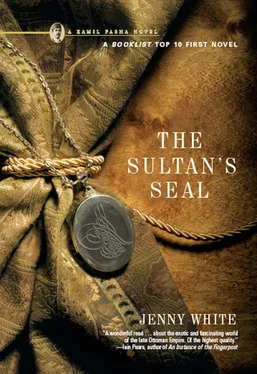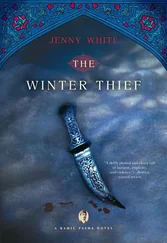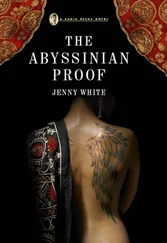Jenny White - The Sultan's seal
Здесь есть возможность читать онлайн «Jenny White - The Sultan's seal» весь текст электронной книги совершенно бесплатно (целиком полную версию без сокращений). В некоторых случаях можно слушать аудио, скачать через торрент в формате fb2 и присутствует краткое содержание. Жанр: Исторический детектив, на английском языке. Описание произведения, (предисловие) а так же отзывы посетителей доступны на портале библиотеки ЛибКат.
- Название:The Sultan's seal
- Автор:
- Жанр:
- Год:неизвестен
- ISBN:нет данных
- Рейтинг книги:5 / 5. Голосов: 1
-
Избранное:Добавить в избранное
- Отзывы:
-
Ваша оценка:
- 100
- 1
- 2
- 3
- 4
- 5
The Sultan's seal: краткое содержание, описание и аннотация
Предлагаем к чтению аннотацию, описание, краткое содержание или предисловие (зависит от того, что написал сам автор книги «The Sultan's seal»). Если вы не нашли необходимую информацию о книге — напишите в комментариях, мы постараемся отыскать её.
The Sultan's seal — читать онлайн бесплатно полную книгу (весь текст) целиком
Ниже представлен текст книги, разбитый по страницам. Система сохранения места последней прочитанной страницы, позволяет с удобством читать онлайн бесплатно книгу «The Sultan's seal», без необходимости каждый раз заново искать на чём Вы остановились. Поставьте закладку, и сможете в любой момент перейти на страницу, на которой закончили чтение.
Интервал:
Закладка:
She pulls at the dead woman’s shoulders to turn the body. Kamil helps her. The cold, clammy texture and unnatural firmness of dead flesh shocks and disgusts him, as it always does.
What is life, he wonders, when death can claim so much of what we are for itself? Here is the woman, whole, yet where is she who had thought, eaten, and perhaps laughed or wept the day before?
At such moments, he wishes intensely that he could believe in the afterlife promised in Islam, the clear rivers and unending companionship. But he had not been able to believe in his youth, and now he believes in a future of science and progress, which is inevitable and eternal, but does not include him beyond his life span. A belief of little comfort to the weak in their flimsy barques, or to the strong when the unforeseen upsets the course upon which they have set their ships. Kamil has known both kinds of men and the immovable anchors of faith that give them the illusion of a steady harbor. They do not understand that they are still at sea and that the danger has not passed. Faith is an anchor in a bottomless sea.
The midwife instructs Kamil to prop the body on its side. When she pulls down on the jaw, a stream of dark water spills from the mouth. She pulls the head forward and pumps the body’s arm. A pink froth bubbles at the lips.
“Drowned. If she were already dead when she entered the water, she would not have breathed water into her lungs.”
They let the body slide back onto the marble. Kamil is grateful to let go. His hands are clammy and he resists the temptation to thrust them into his pockets to warm them.
The midwife points to a large mole on the dead woman’s right shoulder. “That might help to identify her.”
She stands back, waiting for further instructions.
“Thank you. You’ve been most helpful and highly observant.”
She smiles thinly. He muses that this simple village midwife has more scientific acumen than many educated bureaucrats of his acquaintance. It’s a simple matter of reading the given evidence for data, not conjecturing on the basis of possible hypotheses.
Popular fears can fatten fatally on the thinnest gruel, especially in times of insecurity. Like the present. The imperial treasury taken over by European powers as a result of the empire’s debts, wars on many fronts, and factions battling over what kind of government the empire should have-a parliament or undiluted power in the hands of the sultan. In every direction, the empire’s provinces are being clawed away by nationalists supported by Europe and Russia. The streets of Istanbul teem with refugees. Kamil doubts whether even a parliament could stem the bleeding of treasure, land, and people from the great, unwieldy body of the Ottoman state, the boundaries of which these days are as soft and indistinct as those of Fat Orhan at the Turkish bath.
Change creates anxiety, Kamil muses, in high places and low. An anxious populace is eager to be distracted by dark fairy tales. This midwife will keep her sense, though.
She sees the approval in his eyes and smiles again, genuinely this time.
“I would like you to do me one more favor,” he adds. “Ask in the village whether anyone knows this woman, or has heard or seen anything unusual. If so, send a messenger to the magistrate’s headquarters directly, and I will send my assistant to speak with you.” He assumes that, like most of the population, she is unable to read or write.
“We will thank the messenger,” he adds, politely skirting any open discussion of money. “One more thing. You will not mention”-he pauses and gestures toward the body-“the condition of the deceased.”
She agrees and bows her head slightly. She pulls on her outer garments and leaves.
Kamil is alone with the corpse. The body has not yet begun to decompose. It gives off a wet, empty smell.
A sudden movement just outside the circle of light startles him.
“Michel! How long have you been there?”
“I came in right after she began her examination. I sent the police off to find out what they can. I’ll talk to the residents myself later. I thought you might need me here instead.”
Kamil is simultaneously aware that Michel had disobeyed him, but, as if he could read Kamil’s mind, had instead done what Kamil had silently wished.
“Yes, of course,” he agrees reluctantly, aware that somehow he has lost, but unsure in what game.
“I’ve been in the next room, taking notes. The rooms echo. I could hear her perfectly in there. What a perceptive crone, eh?” he says admiringly. “She saved us a lot of examination.”
“Yes, she was very good. We should check with the merchants in the bazaar to see whether they remember who recently bought dried tube flowers.”
“You know, the Istanbul Sephardim tell about drops used by their Spanish ancestors to make their eyes seem black and large; they call the substance belladonna, beautiful woman. I wonder if it’s the same as our humble tube flower.”
Michel walks over to the body, a small bowl in his hand. With a sudden movement, he turns the body onto its side and presses on its chest. A thin stream of liquid spurts from its mouth into the bowl.
Michel examines the liquid. “I’ll be able to tell from this whether she drowned in salt water or fresh.” He eyes the leather bag of tools still lying at the head of the corpse. “I could check the contents of her stomach.”
“I think we can’t afford to do anything before contacting the foreign embassies. If this is one of their nationals, they won’t want us to return a carved-up body.”
“Yes, you’re quite right.” Michel looks disappointed.
“Give me the cutters.”
Kamil snaps the necklace chain. He works at the clasp of the bracelet and pulls it off. Opening the pendant, he hands it to Michel.
“There is a tughra inside.”
Michel turns the pendant over in his hand and examines it from all sides. “And some other markings. Do you know what they are?”
“I don’t.”
“She has some connection to the palace, then?”
“Perhaps. I wonder. Eight years ago, an Englishwoman was found dead just north of here at Chamyeri. A governess at the palace, Hannah Simmons. They found her floating in a pond. She’d been strangled.” He frowns. “I don’t suppose there’s a connection.”
He doesn’t mention that the victim’s name stuck in his mind because the superintendent of police for Beyoglu was removed from office by the minister of gendarmes-the man who had replaced his father-because he had failed to find the murderer. Kamil had perused the file on the murder when new at his job, but decided not to reopen the case. Too many years had gone by and it was not politically expedient to try to solve an unsolvable crime, especially one that involved members of the powerful foreign community and the sultan’s palace. Now here is another young foreign woman dead, this time on his watch. He stiffens his posture to hide his anxiety and his excitement.
“That was the body found on the scholar’s property above Chamyeri. It made for a lot of gossip at the time,” Michel remembers.
“That’s right. Ismail Hodja’s house.” The lesser details in Hannah Simmons’s file had been shouldered aside by the continual press of new cases.
He ponders the young woman on the platform. “Just a coincidence, probably. She could be Circassian or from the Balkans. They’re often yellow-haired with light-colored eyes. Anyway, Chamyeri is quite a ways north of Middle Village.”
“Not that far by water. The current is powerful there. A corpse thrown in at Chamyeri would end up at Middle Village in no time at all. If the killer is the same person, then either he lives in that area or is a frequent visitor. One has to know the Bosphorus to navigate it or to wander its shores at night. The wild dogs alone would keep people away.”
Читать дальшеИнтервал:
Закладка:
Похожие книги на «The Sultan's seal»
Представляем Вашему вниманию похожие книги на «The Sultan's seal» списком для выбора. Мы отобрали схожую по названию и смыслу литературу в надежде предоставить читателям больше вариантов отыскать новые, интересные, ещё непрочитанные произведения.
Обсуждение, отзывы о книге «The Sultan's seal» и просто собственные мнения читателей. Оставьте ваши комментарии, напишите, что Вы думаете о произведении, его смысле или главных героях. Укажите что конкретно понравилось, а что нет, и почему Вы так считаете.












